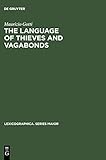The Language of Thieves and Vagabonds : 17th and 18th Century Canting Lexicography in England / Maurizio Gotti.
Material type: TextSeries: Lexicographica. Series Maior : Supplementbände zum Internationalen Jahrbuch für Lexikographie ; 94Publisher: Tübingen : Max Niemeyer Verlag, [2012]Copyright date: ©1999Edition: Reprint 2012Description: 1 online resource (159 p.)Content type:
TextSeries: Lexicographica. Series Maior : Supplementbände zum Internationalen Jahrbuch für Lexikographie ; 94Publisher: Tübingen : Max Niemeyer Verlag, [2012]Copyright date: ©1999Edition: Reprint 2012Description: 1 online resource (159 p.)Content type: - 9783484309944
- 9783110924404
- 427/.09 22
- PE3726 .G688 1999eb
- online - DeGruyter
- Issued also in print.
| Item type | Current library | Call number | URL | Status | Notes | Barcode | |
|---|---|---|---|---|---|---|---|
 eBook
eBook
|
Biblioteca "Angelicum" Pont. Univ. S.Tommaso d'Aquino Nuvola online | online - DeGruyter (Browse shelf(Opens below)) | Online access | Not for loan (Accesso limitato) | Accesso per gli utenti autorizzati / Access for authorized users | (dgr)9783110924404 |
Frontmatter -- Contents -- Preface -- Chapter 1. The English Underworld in the 16th–18th Centuries -- Chapter 2. Early Canting Literature -- Chapter 3. The New Canting Terms Reported by Richard Head -- Chapter 4. The Canting Terms of Coles’ Dictionary -- Chapter 5. Β.E.’s Innovative Approach -- Chapter 6. The Canting Component of The Ladies Dictionary -- Chapter 7. Alexander Smith’s Thieves New Canting Dictionary -- Chapter 8. Lexical Additions in A New Canting Dictionary -- Chapter 9. John Poulter’s Canting Expressions -- Chapter 10. Francis Grose’s Classical Dictionary of the Vulgar Tongue -- Chapter 11. The Evolution of the Concept of Cant in the 17th and 18th Centuries -- Appendices -- Bibliography -- Summaries -- Indexes
restricted access online access with authorization star
http://purl.org/coar/access_right/c_16ec
The object of the volume is the analysis of the main dictionaries and glossaries of the canting language (the particular jargon spoken by thieves and vagabonds) that appeared in the 17th and 18th centuries. The scholars' attention has mostly concentrated on the earliest publications - particulary those appearing in the Elizabethan period -, while relatively little research has investigated subsequent canting dictionaries and glossaries. The aim of the present volume is to fill this gap. The main works on canting published in the 17th and 18th centuries are analysed in chapters 3 to 10. The first two chapters provide a necessary introduction to the investigation carried out in the subsequent sections, examining the great increase in the numbers of vagabonds and criminals in England in that period from a sociohistorical perspective and reviewing the 16th-century English literature about the underworld. The subsequent eight chapters give a detailed analysis of the main works on canting which appeared in the second part of the 17th century and during the whole of the 18th century. The specific features of each publication are identified, as well as the method adopted by its author in the compilation of his dictionary/glossary and the most likely sources of its entries, in order to determine the degree of novelty and relevance that his contribution has brought to this field. The final chapter deals with the evolution in the meaning of the term 'cant' itself in the period taken into consideration.
Issued also in print.
Mode of access: Internet via World Wide Web.
In English.
Description based on online resource; title from PDF title page (publisher's Web site, viewed 28. Feb 2023)


